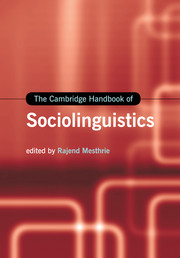Book contents
- The Cambridge Handbook of Sociolinguistics
- Series page
- The Cambridge Handbook of Sociolinguistics
- Copyright page
- Contents
- Figures
- Tables
- Contributors
- Preface and acknowledgments
- Abbreviations
- 1 Introduction: the sociolinguistic enterprise
- Part I Foundations of sociolinguistics
- 2 Power, social diversity, and language
- 3 Linguistic anthropology: the study of language as a non-neutral medium
- 4 The social psychology of language: a short history
- 5 Orality and literacy in sociolinguistics
- 6 Sign languages
- Part II Interaction, style, and discourse
- Part III Social and regional dialectology
- Part IV Multilingualism and language contact
- Part V Applied sociolinguistics
- Notes
- References
- Index
5 - Orality and literacy in sociolinguistics
from Part I - Foundations of sociolinguistics
Published online by Cambridge University Press: 05 June 2012
- The Cambridge Handbook of Sociolinguistics
- Series page
- The Cambridge Handbook of Sociolinguistics
- Copyright page
- Contents
- Figures
- Tables
- Contributors
- Preface and acknowledgments
- Abbreviations
- 1 Introduction: the sociolinguistic enterprise
- Part I Foundations of sociolinguistics
- 2 Power, social diversity, and language
- 3 Linguistic anthropology: the study of language as a non-neutral medium
- 4 The social psychology of language: a short history
- 5 Orality and literacy in sociolinguistics
- 6 Sign languages
- Part II Interaction, style, and discourse
- Part III Social and regional dialectology
- Part IV Multilingualism and language contact
- Part V Applied sociolinguistics
- Notes
- References
- Index
Summary
- Type
- Chapter
- Information
- The Cambridge Handbook of Sociolinguistics , pp. 70 - 82Publisher: Cambridge University PressPrint publication year: 2011
- 4
- Cited by



